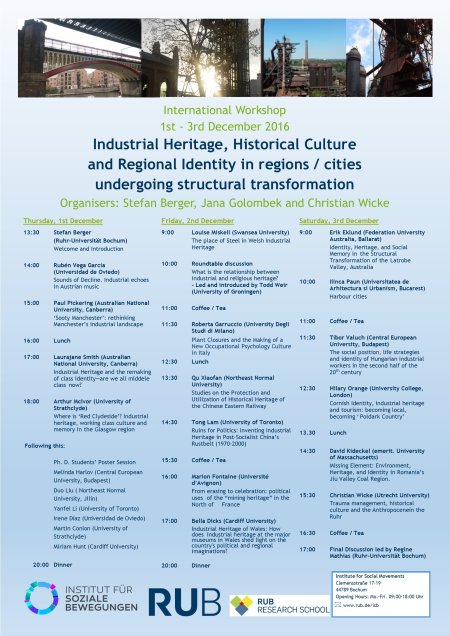Industrial Heritage, Historical Culture and Regional Identity in regions/cities undergoing structural transformation
This workshop discusses the interrelationship between industrial heritage, historical culture and regional identity in regions/ cities undergoing structural transformation. We are particularly interested in regions and cities that were previously built on heavy industry and that have been forced to rethink their economic base. The papers discussed at the conference seek to shed light on moments when the industrial past is memorised and they ask who is doing the memorising and to what end things are memorised. Memory agents can be grassroots initia-tives but also states, regional and local governments as well as businesses or trade unions and others more. We are also interested in the links of memory cultures in regions/ cities un-dergoing structural transformation and its links with commercial motifs of region-branding, local patriotism and nostalgia.
1. Economic Development
What impact did the economic development of de-industrializing regions and cities have on the emergence of industrial heritage and its accompanying historical cultures and regional identity discourses? To what extent has economic success or failure been important in foster-ing or preventing the emergence of specific industrial heritage discourses?
2. Conditions of Labour
To what extent have industrial heritage sites and accompanying historical cultures in deindus-trialising regions/cities articulated a critical consciousness of the exploitation of labour, forced labour and hierarchical labour relations? How have these questions been included into the regional/city museums and industrial heritage discourses?
3. Environmental Conditions
To what extent have historical cultures in deindustrialising regions/cities articulated a critical consciousness of the exploitation of natural resources and the environment? How have envi-ronmental concerns been included into the museums and industrial heritage discourses?
4. Political Conditions
To what extend have specific political institutions, arrangements and cultures affected indus-trial heritage discourses? Did it matter what political ideologies were hegemonic in specific regions/ cities? How politically contested were industrial heritage discourses and why was this the case?
5. Urban/Regional Conditions
To what extent have industrial heritage sites and their accompanying broader historical cul-tures in deindustrialising regions/cities articulated a critical consciousness of urban/regional development? How have concerns about urban development in industrial cities been included into the museums and industrial heritage sites and discourses in cities/regions undergoing structural transformation? To what extent has historical consciousness influenced urban so-cial movements and shaped the urban renewal of those cities/regions undergoing structural transformation?
6. Cultural Conditions
To what extent did specific cultural landscapes and agents (museums, theatre, music, litera-ture, popular culture) shape industrial heritage discourses in de-industrializing regions/ cities? How did cultural groups engage with industrial pasts and how did they make use of industrial heritage locations?


